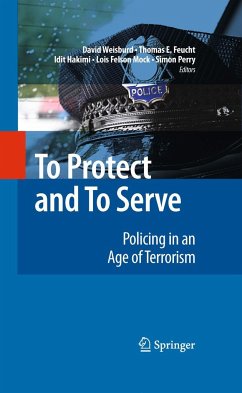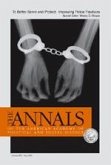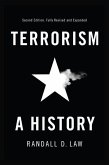To Protect and to Serve
Policing in an Age of Terrorism
Herausgegeben:Weisburd, David; Feucht, Thomas; Hakimi, Idit; Mock, Lois; Perry, Simon
To Protect and to Serve
Policing in an Age of Terrorism
Herausgegeben:Weisburd, David; Feucht, Thomas; Hakimi, Idit; Mock, Lois; Perry, Simon
- Gebundenes Buch
- Merkliste
- Auf die Merkliste
- Bewerten Bewerten
- Teilen
- Produkt teilen
- Produkterinnerung
- Produkterinnerung
The threat of terrorism is a key issue in police agencies worldwide. This unique book brings together American and Israeli policing scholars who pool their knowledge to shed light on recent developments in policing and what future trends to expect.
It provides the first comprehensive assessment of the role of the police in homeland security functions, the effectiveness of strategies, the impacts of homeland security threats on police organization, and on the relationships between police and community. | The book's authors include some of the best known scholars in policing and in the area…mehr
![To Better Serve and Protect To Better Serve and Protect]() Wesley G SkoganTo Better Serve and Protect122,99 €
Wesley G SkoganTo Better Serve and Protect122,99 €![Sicherheit und Gesellschaft Sicherheit und Gesellschaft]() Nadja MrowetzSicherheit und Gesellschaft139,00 €
Nadja MrowetzSicherheit und Gesellschaft139,00 €![To Protect and Serve To Protect and Serve]() Norm StamperTo Protect and Serve33,99 €
Norm StamperTo Protect and Serve33,99 €![Terrorism Terrorism]() Randall D. LawTerrorism23,99 €
Randall D. LawTerrorism23,99 €![Terrorism Terrorism]() Randall D. LawTerrorism95,99 €
Randall D. LawTerrorism95,99 €![Write to Protect and Serve Write to Protect and Serve]() John CagleWrite to Protect and Serve51,99 €
John CagleWrite to Protect and Serve51,99 €![No Place to Hide No Place to Hide]() Glenn GreenwaldNo Place to Hide12,99 €
Glenn GreenwaldNo Place to Hide12,99 €-
-
-
- It provides the first comprehensive assessment of the role of the police in homeland security functions, the effectiveness of strategies, the impacts of homeland security threats on police organization, and on the relationships between police and community.
- The book's authors include some of the best known scholars in policing and in the area of policing terrorism brought together by the National Institute of Justice and the Ministry of Public Security in Israel to provide cutting edge discussion of the challenges presented by terrorism for police in democratic societies.
- Each chapter includes not only an up to date survey of the literature in the areas covered, but also a discussion what we need to know to develop better policies and practices.
- Produktdetails
- Verlag: Springer / Springer New York / Springer, Berlin
- Artikelnr. des Verlages: 12077533, 978-0-387-73684-6
- 2011 edition
- Seitenzahl: 230
- Erscheinungstermin: 13. Juli 2009
- Englisch
- Abmessung: 241mm x 164mm x 23mm
- Gewicht: 502g
- ISBN-13: 9780387736846
- ISBN-10: 0387736840
- Artikelnr.: 22911810
- Verlag: Springer / Springer New York / Springer, Berlin
- Artikelnr. des Verlages: 12077533, 978-0-387-73684-6
- 2011 edition
- Seitenzahl: 230
- Erscheinungstermin: 13. Juli 2009
- Englisch
- Abmessung: 241mm x 164mm x 23mm
- Gewicht: 502g
- ISBN-13: 9780387736846
- ISBN-10: 0387736840
- Artikelnr.: 22911810
The Steering Committee will write an introduction to this volume that would seek to identify the importance of examining the topic of policing in an age of terrorism and beyond. What factors made it critical to develop this work, and what type of contribution do we hope that this volume will make. The introduction would also trace the major themes of the previous decade to put these issues in context, and raise a series of questions that are linked to the chapters. This introductory chapter should explain why we have selected the chapters included and how they relate to each other to form a cogent thematic volume.
Paper 1: The Threat of Terrorism in Democratic Societies: An Assessment
What is terrorism? What forms does it take? What new social and political problems does it create for democratic societies? This first paper should provide a clear statement of what is known about terrorism. It should review the threats faced and provide data on such issues as the number of attacks, their seriousness and the outcomes in terms of human, social and economic costs. The paper should be comparative and look at terrorism globally with a strong focus on Western democracies. This paper should also go beyond a simple description of terrorism, and look at the wider social impacts of terrorism, with an emphasis on the possible relationships between terrorism and crime.
Authors: Two papers: 1)Gary LaFree & Laura Dugan 2)Boaz Ganor
Paper 2: Terrorism and the Police: Competing Perspectives and Dilemmas regarding the Role of the Police (and other Institutions) in Fighting Terrorism
While many scholars and lay people take for granted the fact that the police should play a central role in the fight against terrorism, this chapter seeks to examine the rationale for the police role. What role should the police play in the complex task of preventing, and responding to terror, and responding to the outcomes of terror? In this chapter this question is made problematic. The authors will lay out the reasoning behind the different roles that the police may play in this process, and describing how different democratic societies have defined this role. Are there models of policing in democratic society in which the police role is less pronounced and models that the role is more pronounced (e.g. as in Israel)? What problems are raised by cooperation with other agencies and how is that affected by the division of labor in fighting terrorism? This chapter would also examine how private security has affected the police mandate.
Authors: David Bayley & David Weisburd
Paper 3: Police Strategies and Tactics in Fighting Terrorism and Crime: What We Know and What we Need to Know
This chapter would begin with a description of the specific strategies and tactics that police agencies have developed to deal with terrorism (and the outcomes of terrorism). It would seek to develop a typology of such strategies and if possible describe the costs of implementing them in police agencies. It would include both tactical approaches and technology. It would seek to define the source of strategies and tactics, and the evidentiary foundations (if any) for their use. Ideally this chapter would also say something about the "diffusion" of such innovation across police agencies. How has that happened and how could such diffusion of innovation be encouraged? (This would be especially important in the case of technology). The key element of this chapter is an assessment of what works both in preventing terrorism and in dealing with its consequences. Do we have evidence at this time that would lead us to move in one direction or another? Have technological improvements been assessed empirically and what is known regarding their use? What types of studies are needed to define promising tactics and strategies?
Authors: Cynthia Lum and Maki Haberfeld
Paper 4: The Impact of Fighting Terrorism on Police Organizations
A critical issue that has received comparatively little attention is the impacts of fighting terrorism on the police as an organization. How have police agencies responded organizationally to the added responsibilities of fighting terrorism? Have they created new organizational structures, or special units to cope with the new demands of responding to terrorism and its aftermath? How has the fight against terrorism affected the allocation of personnel, and of financial resources in policing? How have changes in federal, state and local funding for terrorism preparedness and responses affected police organizations? The paper would also include a discussion of leadership and management issues, training, recruitment, and resource allocation (e.g. equipment).
Authors: Jack Greene and Sergio Herzog
Paper 5: The Impact of Policing Terrorism on Society and the Community
When discussing the role of the police in fighting terrorism, one is naturally drawn to police effectiveness in preventing terrorism and minimizing its consequences. However, police activities may also have intended and unintended influences on communities and societies as a whole. One important role of the police is to increase a public sense of security and safety. The police succeed in fighting terrorism when the public is able to live daily lives in a "normal" fashion. But fighting terrorism may have unequal influence on different communities. For example, Arab minority communities in Israel and the United States may feel singled out in the fight against terrorism. What impact does that have on those communities, and the ability of the police to serve and protect these citizens? What issues of legitimacy are raised, and what new legal problems must be addressed? Does the focus on terrorism naturally lead to a social cost in terms of service to the community in such programs as Community Policing? Are there competing interests between handing terrorism and handling other major crime problems (i.e. traditional crime reduction and public safety concerns)? What is the experience of different Western Democracies in regard to each of these dimensions of the impacts of fighting terrorism on community and society?
Authors: Badi Hasisi & Geoff Alpert
Paper 6: The New Police?: Alternative Futures for Police and Police Strategies
This paper would take a "futurists" point of view and try to define promising solutions to the problems that the book as a whole identifies. It would include a discussion of other public safety and security challenges beyond terrorism that law enforcement needs to address in the near future-for example, gangs, drugs, human trafficking, cyber-crime. It would seek to identify what technologies need to be developed in the future, based on what is known about technology today and what is on the horizon. Importantly, this chapter would provide visions of alternative futures both in terms of the way police might organize and in terms of the strategies that they would need to develop. Are police departments equipped to handle the basic challenges of law enforcement in the 21st century? What needs to change and what should remain the same?
Authors: John Eck & Dani Gimshi
VII. Conclusions
The SC will write a final chapter that tries to draw the main themes of the book together. Ideally this chapter would have not only an integrative approach, but would also add new ideas and draw new themes for the reader.
The Steering Committee will write an introduction to this volume that would seek to identify the importance of examining the topic of policing in an age of terrorism and beyond. What factors made it critical to develop this work, and what type of contribution do we hope that this volume will make. The introduction would also trace the major themes of the previous decade to put these issues in context, and raise a series of questions that are linked to the chapters. This introductory chapter should explain why we have selected the chapters included and how they relate to each other to form a cogent thematic volume.
Paper 1: The Threat of Terrorism in Democratic Societies: An Assessment
What is terrorism? What forms does it take? What new social and political problems does it create for democratic societies? This first paper should provide a clear statement of what is known about terrorism. It should review the threats faced and provide data on such issues as the number of attacks, their seriousness and the outcomes in terms of human, social and economic costs. The paper should be comparative and look at terrorism globally with a strong focus on Western democracies. This paper should also go beyond a simple description of terrorism, and look at the wider social impacts of terrorism, with an emphasis on the possible relationships between terrorism and crime.
Authors: Two papers: 1)Gary LaFree & Laura Dugan 2)Boaz Ganor
Paper 2: Terrorism and the Police: Competing Perspectives and Dilemmas regarding the Role of the Police (and other Institutions) in Fighting Terrorism
While many scholars and lay people take for granted the fact that the police should play a central role in the fight against terrorism, this chapter seeks to examine the rationale for the police role. What role should the police play in the complex task of preventing, and responding to terror, and responding to the outcomes of terror? In this chapter this question is made problematic. The authors will lay out the reasoning behind the different roles that the police may play in this process, and describing how different democratic societies have defined this role. Are there models of policing in democratic society in which the police role is less pronounced and models that the role is more pronounced (e.g. as in Israel)? What problems are raised by cooperation with other agencies and how is that affected by the division of labor in fighting terrorism? This chapter would also examine how private security has affected the police mandate.
Authors: David Bayley & David Weisburd
Paper 3: Police Strategies and Tactics in Fighting Terrorism and Crime: What We Know and What we Need to Know
This chapter would begin with a description of the specific strategies and tactics that police agencies have developed to deal with terrorism (and the outcomes of terrorism). It would seek to develop a typology of such strategies and if possible describe the costs of implementing them in police agencies. It would include both tactical approaches and technology. It would seek to define the source of strategies and tactics, and the evidentiary foundations (if any) for their use. Ideally this chapter would also say something about the "diffusion" of such innovation across police agencies. How has that happened and how could such diffusion of innovation be encouraged? (This would be especially important in the case of technology). The key element of this chapter is an assessment of what works both in preventing terrorism and in dealing with its consequences. Do we have evidence at this time that would lead us to move in one direction or another? Have technological improvements been assessed empirically and what is known regarding their use? What types of studies are needed to define promising tactics and strategies?
Authors: Cynthia Lum and Maki Haberfeld
Paper 4: The Impact of Fighting Terrorism on Police Organizations
A critical issue that has received comparatively little attention is the impacts of fighting terrorism on the police as an organization. How have police agencies responded organizationally to the added responsibilities of fighting terrorism? Have they created new organizational structures, or special units to cope with the new demands of responding to terrorism and its aftermath? How has the fight against terrorism affected the allocation of personnel, and of financial resources in policing? How have changes in federal, state and local funding for terrorism preparedness and responses affected police organizations? The paper would also include a discussion of leadership and management issues, training, recruitment, and resource allocation (e.g. equipment).
Authors: Jack Greene and Sergio Herzog
Paper 5: The Impact of Policing Terrorism on Society and the Community
When discussing the role of the police in fighting terrorism, one is naturally drawn to police effectiveness in preventing terrorism and minimizing its consequences. However, police activities may also have intended and unintended influences on communities and societies as a whole. One important role of the police is to increase a public sense of security and safety. The police succeed in fighting terrorism when the public is able to live daily lives in a "normal" fashion. But fighting terrorism may have unequal influence on different communities. For example, Arab minority communities in Israel and the United States may feel singled out in the fight against terrorism. What impact does that have on those communities, and the ability of the police to serve and protect these citizens? What issues of legitimacy are raised, and what new legal problems must be addressed? Does the focus on terrorism naturally lead to a social cost in terms of service to the community in such programs as Community Policing? Are there competing interests between handing terrorism and handling other major crime problems (i.e. traditional crime reduction and public safety concerns)? What is the experience of different Western Democracies in regard to each of these dimensions of the impacts of fighting terrorism on community and society?
Authors: Badi Hasisi & Geoff Alpert
Paper 6: The New Police?: Alternative Futures for Police and Police Strategies
This paper would take a "futurists" point of view and try to define promising solutions to the problems that the book as a whole identifies. It would include a discussion of other public safety and security challenges beyond terrorism that law enforcement needs to address in the near future-for example, gangs, drugs, human trafficking, cyber-crime. It would seek to identify what technologies need to be developed in the future, based on what is known about technology today and what is on the horizon. Importantly, this chapter would provide visions of alternative futures both in terms of the way police might organize and in terms of the strategies that they would need to develop. Are police departments equipped to handle the basic challenges of law enforcement in the 21st century? What needs to change and what should remain the same?
Authors: John Eck & Dani Gimshi
VII. Conclusions
The SC will write a final chapter that tries to draw the main themes of the book together. Ideally this chapter would have not only an integrative approach, but would also add new ideas and draw new themes for the reader.








